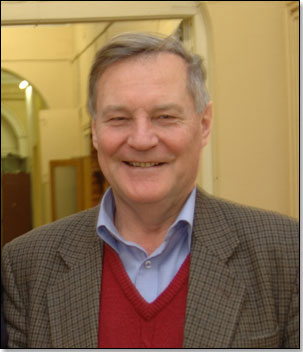 |
RSS feeds |
|
|||||
| Issue 1, 2026 |
|
||||||
|
|
|
||||||

|
60 seconds with authors: Prof. Igor Mikhailovich DreminProf. Igor Mikhailovich DreminLebedev Physics Institute, Russian Academy of Sciences, Moscow, Russia
What led you into science and your chosen area of research?
Interest in physics and uncle’s advices, first, and then the impact by I.Ya. Pomeranchuk – my first science advisor. Can you describe the results in your paper and their importance for your field? f this is the paper on wavelets (2001), then the wide uses of them in many fields (both fundamental and applied science) are main results. This is unique possibility to get reliable information about many processes in Nature. Our activity started with attempts to analyze processes of hadronic interactions with very many particles produced and was extended to apllications to aviation, medicine, reactors. Patents have been obtained for precursors of engine damaging effects (surge, flatter). There is another Physics-Uspekhi (1994) review of mine (this time on Quantum Chromodynamics [Dremin I M "Quantum chromodynamics and multiplicity distributions" Phys. Usp. 37 715 (1994)], closer to my main interests) which is widely cited (see SLAC registry). It describes the proposed by me new effective methods of analysis of experimental distributions of particles produced in hadronic processes at very high energies. What research projects are you working on at the moment? On my idea (1979) on Cherenkov gluons in QCD which was only recently (2005) strongly supported by experiment. In this connection I developed in-medium QCD (related to in-vacuum QCD, as in-medium Maxwell eqs to those in-vacuum QED). What do you think will be the next big breakthrough in your field? The experimental data from LHC and their theoretical description. What book are you reading right now? On Cherenkov effects in plasma physics. If you could have dinner with any 3 people, past or present, who would they be and why?
ÈIgor Tamm – the founder of our Theory department who had strong impact on me, both human and scientific;
Sheldon Glashow – we shared the same office in Niels Bohr Institute for 2 months in 1963 and met only once since then at 1996 conference;
What has been the most exciting moment in your career so far? The ideas about peripheral interactions of hadrons and my calculation of their cross sections at the time when central interactions described by Landau hydrodynamical theory prevailed (probably, because I was young then). Also, it is very exciting to get interpretation of some experimental facts with low statistics which is approved later by accelerator data (as it happened with my ideas about Cherenkov gluons and rather large cross sections for charm production at high energies). What would you like to say in connection with the 90th anniversary of “Uspekhi Fizicheskikh Nauk” journal? I wish it to be as good as always before. |
 |
|
© 1918–2026 Uspekhi Fizicheskikh Nauk Email: ufn@ufn.ru Editorial office contacts About the journal Terms and conditions |